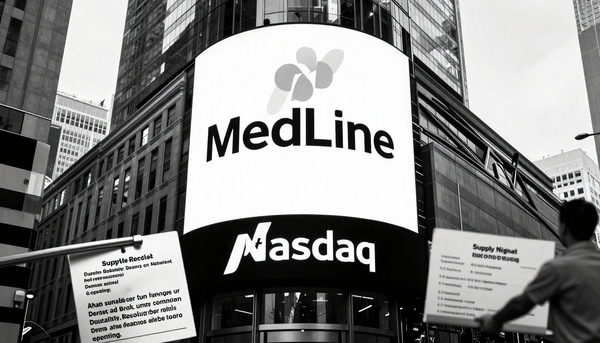GameStop Executes $513 Million Bitcoin Purchase as Corporate Treasury Strategy

BTC Peers reports that GameStop Corp purchased 4,710 Bitcoin on May 28, 2025. The US video game and consumer electronics retailer confirmed its first Bitcoin investment through a statement posted on the company's X account. The purchase represents approximately $513 million at current Bitcoin prices.
GameStop did not specify the exact purchase price or timing in its announcement. The company's Form 8-K filing with the US Securities and Exchange Commission provides minimal additional details. This acquisition follows GameStop's March 2025 disclosure of plans to invest in Bitcoin using proceeds from a $1.3 billion convertible notes offering.
Corporate Bitcoin Treasury Movement Accelerates
GameStop joins a growing list of publicly traded companies adopting Bitcoin treasury strategies. PYMNTS notes that companies view Bitcoin not just as an investment, but as a leveraged financial asset that can be used strategically. Strategy (formerly MicroStrategy) pioneered corporate Bitcoin adoption with its first purchase in August 2020.
The number of Bitcoin in corporate treasuries grew by 31% in 2024, reaching 998,374 BTC according to BitcoinTreasuries data reported by CTMfile. This surge in corporate adoption was facilitated by new guidelines from the US Financial Accounting Standards Board, which allowed companies to report crypto holdings at fair market value.
CoinDesk reports that companies including Japan's Metaplanet, Brazil's Meliuz, and medical device manufacturer Semler Scientific continue expanding their Bitcoin holdings throughout 2024 and 2025. GameStop now ranks as the 13th largest public Bitcoin holder globally, surpassing Semler Scientific's 4,624 Bitcoin holdings by 86 Bitcoin.
Corporate treasuries implement Bitcoin strategies for multiple reasons according to financial analysts. Companies cite inflation protection, portfolio diversification, and potential appreciation as primary motivations. The approval of Bitcoin exchange-traded funds in the United States has facilitated increased corporate access to cryptocurrency investments.
Market Conditions and Strategic Context
GameStop's Bitcoin acquisition occurs during sustained price growth for the cryptocurrency. Bitcoin currently trades near $109,000 after reaching new all-time highs in 2025. Coinbase institutional research indicates that crypto markets are poised for transformative growth in 2025, continuing their momentum of maturation and adoption.
The purchase reflects GameStop's broader business transformation under Chairman Ryan Cohen's leadership. Reuters reports that GameStop's board unanimously approved adding Bitcoin as a treasury reserve asset. The company has been aggressively cutting costs, closing 590 stores in the United States in fiscal 2024 and anticipating closing additional stores in fiscal 2025.
GameStop's fourth-quarter net income more than doubled to $131.3 million compared to the same period last year. However, the company reported fourth-quarter revenue of $1.28 billion, compared to $1.79 billion a year earlier, reflecting challenges from the shift toward digital downloads and e-commerce shopping.
Major financial institutions including JPMorgan, Goldman Sachs, and BlackRock now offer Bitcoin-related services to institutional clients. Consultancy-ME explains that well-known examples of companies embracing Bitcoin as a financial reserve include Strategy, Tesla, Block, Galaxy Digital, and energy multinational Aker.
Broader Financial System Implications
GameStop's Bitcoin purchase reflects broader institutional acceptance of digital assets within traditional finance. However, concerns remain about corporate Bitcoin adoption. Volatility continues to present risks for companies allocating substantial treasury funds to cryptocurrency. Regulatory uncertainty persists despite recent clarity improvements in the United States.
Some financial experts question whether Bitcoin's price appreciation justifies the operational complexities of digital asset management. The Federal Reserve and other central banks monitor corporate Bitcoin adoption for potential systemic risks. Traditional financial institutions express mixed views on cryptocurrency's role in corporate treasuries.
Corporate Bitcoin adoption appears likely to continue expanding based on current trends. Institutional infrastructure has improved substantially since Strategy's pioneering purchases in 2020. Enhanced custody solutions, clearer accounting standards, and regulatory frameworks support corporate decision-making processes.
GameStop's entry into Bitcoin treasury management demonstrates the strategy's appeal beyond technology companies. Traditional retailers and established corporations increasingly view Bitcoin as a legitimate asset class worthy of treasury allocation consideration. The growing institutional adoption may drive demand and price appreciation over time, while also providing portfolio diversification benefits for participating companies.
The development represents another step in Bitcoin's evolution from a fringe digital asset to a mainstream corporate treasury tool. As regulatory frameworks continue to mature and institutional infrastructure expands, more companies may follow GameStop's lead in allocating portions of their cash reserves to Bitcoin.
Related Reading on Morrow Report
Explore the Alternative Financial Systems Index to understand how different financial systems compare across effectiveness metrics. This comprehensive resource analyzes transaction costs, access speed, trust mechanisms, and network effects across decentralized finance, community banking, microfinance, blockchain currencies, and peer-to-peer systems. The index provides quantitative data showing which alternative financial systems achieve the highest adoption rates and economic impact, helping readers evaluate Michigan's cryptocurrency legislation within the broader landscape of financial innovation and alternative economic models.




